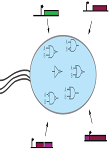|
|
|
Whole-cell modeling for synthetic biology
|
|
|
|
|
|
|
|
|
|

|
|
|
Piro Siuti
|
|
|
|
Massachusetts Institute of Technology.
|
Department of Electrical Engineering & Computer Science and Department of Biological Engineering, Massachusetts Institute of Technology, 77 Massachusetts Avenue, Cambridge, MA 02139, USA.
|
|
psiuti@mit.edu
|
|
|
|
|
|
|
|
|
|

|
Synthetic biology is a relatively new field that brings together scientists from different areas of research such as physics, engineering, mathematics, biochemistry and biology. A major goal of synthetic biology is to design and build synthetic gene networks in order to better understand existing pathways and reprogram organisms with novel functions for a variety of new applications. Initial work in synthetic biology has consisted of synthesizing simple gene circuits with predictable behavior such as the toggle switch, a stable negative feedback system, and a synthetic oscillatory network. These pioneering studies lead to an increased interest in the field, facilitating other synthetic cellular systems such as tunable oscillators and mammalian switches, bacterial systems capable of detecting light, circuits that lead to differential gene expression, synthetic logic gates with concomitant DNAâ€encoded memory storage, and networks capable of counting cellular metabolic events. Mathematical modeling has played a critical role in developing these systems; however,........
|
|
|
|
|
|
|
|

|
|